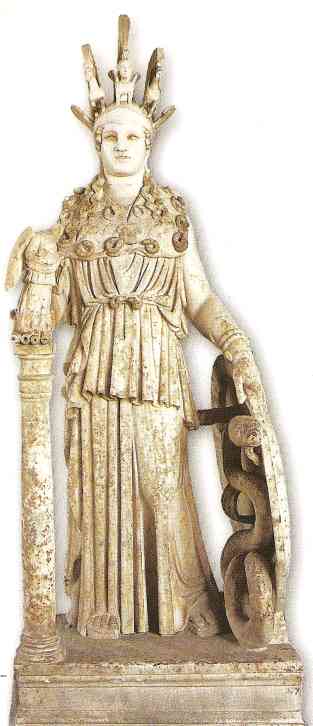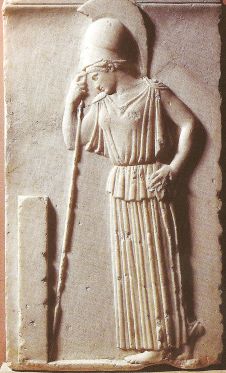|
Athena, the greek goddess of war and wisdom

The virgin goddess of war Athena was one of the most important deities among the twelve gods of Mount Olympus. She was loved throughout the ancient Greek world.
All ancient documents refer to her as Zeus’s favorite daughter. As a matter of fact, she is often cited as omnivopatri, which in Greek means “daughter of a powerful father”.
The two primary poets of ancient Greece, Hesiod and Homer, narrate the unusual way she was given birth. Today, scholars of Greek Mythology agree that the way she was given birth is considered to be a metaphor for meteorological phenomena such as clouds, thunder, lighning, storms, etc.
Click on the following links to go directly to the relevant chapter:
A remarkable birth
Relationship to other Olympians
Relationship with greek heroes
The goddess’s many traits
Protectress of the Arts
In Theogony, Hesiod describes how Uranus and Gaia persuaded Zeus to swallow his pregnant wife Metis, who was wiser than gods and humans, so that he would not lose his power to her.
When Metis was ready to deliver her child, Hephaestus (or by other accounts Prometheus) split open Zeus’s skull and out sprung Athena, in full war gear.
As Hesiod describes, at the exact moment of the goddess’s birth, the sky was torn and a loud noise echoed across the earth, while enormous waves whipped the sea and the sun stopped moving, until Athena removed her armor.
There are numerous other accounts of the birth of the goddess of wisdom. According to one, she emerged in Crete from a cloud that Zeus struck with his thunderbolt.
In another account, the goddess is considered to be the daughter of Pallas, a winged giant, whom she later killed, when he tried to seduce her.
[top]
Being an Olympian goddess, Athena had to maintain relationships with the rest of the divine residents of the holy mountain. The most notable of these social interactions, were the following:
- Zeus: As mentioned above, the goddess was Zeus’s favorite child, as she helped him in Zeus’s battle against the Giants. For her role in this significant event, Athena is sometimes referred to as Gigantoleitera, Gigantoletis, or Gigantofontis (Giant slayer).
According to Homer, however, her match with Zeus was not quite perfect: She once conspired with Hera and Poseidon to bind Zeus, when his authoritarian style of rule became unbearable; apparently a venture with no success, as the story goes.
- Hephaestus: In general, in the ancient Greek world, the goddess personified virginity. However, as the myth goes, she had to fight back Hephaestus when the god tried to rape her. When the goddess tried to wipe a drop of her attacker’s semen which dribbled on her leg, this fell on earth. As a result, an early king of Athens by the name of Ericthonius, was born on the spot.
- Poseidon: The most important event which associates the goddess with the god of the sea, is their competition to win the patronage of Athens. Several versions of this confrontation exist in ancient greek literature, but the most prominent are the following:
- During the contest, Poseidon first struck the rock of Acropolis with his trident, thus causing either a spring of saline water or a horse (symbol of portable water) to emerge from the crack. In this way, the god of the sea signaled to Athenians that he would either help them to turn to the sea, or enrich the land with plenty of water.
When it was her turn, Athena struck the rock with her spear and an olive tree immediately sprouted from the crack.
The Olympian god who were the judges of the contest, decreed to give to the virgin goddess the city patronage. She taught the Athenians how to cultivate the olive tree and produce olive oil. However, the city also suffered long periods of draught, as a result of Poseidon’s bitterness over losing the contest.
- Instead of a head on contest, the Athenians were called to cast their vote over whom they wanted as their patron god. As the myth goes, men voted for Poseidon, while women preferred Athena. Women in ancient Athens outnumbered men, so the virgin goddess was the winner.
Enraged, Poseidon flooded the city. The men, in an effort to appease the god of the sea, stripped of their women their right to vote, their right to give their name to the children and finally their right to be called Athenians.
- Aphrodite: The most widely known confrontation between Athena and the goddess of love, took place when the three Olympian goddesses (Athena, Aphrodite and Hera) participated in a beauty contest to win the title of the “most beautiful” from young Paris, son of the king of Troy.
As it is well known, this event led to the outbreak of the Trojan War, when Paris abducted Helen, being his reward from Aphrodite who won the contest.
Athena’s bitterness over losing the contest to Aphrodite, came out quite clearly during the Trojan War, when she sided with the Greeks against the Trojans. Her hostility against Aphrodite showed when she advised and assisted the greek hero Diomedes, to strike the goddess of love.
[top]
Apart from dealing with her divine counterparts, the goddess had interactions with important mortals as well.
- Hercules; This hero was by far her most favorite. In the course of the execution of the twelve labors of Hercules,the goddess assisted the mighty hero whenever he was in distress. It is worth mentioning her assistance offered, when Hercules was trying to kill the Stymphalian birds.
As a show of gratitude for her valuable contribution to his accomplishements, the hero offered the goddess the apples of the Hesperides, which she returned back to the garden, where they originally belonged.
- Perseus: According to the relevant myth of Perseus slaying the Medusa, Athena’s assistance to the hero was valuable.
After her slaughter, Medusa’s head was placed on Athena’s shield, where it still retained its hideous capacity to turn into stone, whoever cast his eyes on it. The goddess's shield, called aegis, was a basic component of her overall armor, given to her by her divine father, Zeus.
According to myth, this armor was made either from the hide of the goat Amaltheia or from the hide of the Aigis (goat), a hideous Phrygian monster killed by Athena.
- Bellerophon: When Medusa was beheaded, the winged horse Pegasus sprang from the wound. Athena helped the Corinthian hero Bellerophon tame the horse, by appearing in his dream and giving him a magic golden bridle.
[top]
Relief of the goddess Athena
 |
Athena was recognized by ancient Greeks to have many traits, including the powers of war, peace, protection and healing.
Her fighting capabilities were accepted to be even superior to those of the war god Ares. She was an inspiration to those involved in battle, by bestowing them with courage and prudence, being a guarantor of victory for those who respected and worshipped her.
For this reason, she was known as Athena Nike (Victory) as well as Akraia (meaning “at the edge”), since the sanctuaries dedicated to the goddess were usually located at the edge of the city’s acropolis, thus being the last line of defence during an enemy attack.
The virgin goddess is also credited as a trainer of war horses, thus named Damasippos (“horse trainer”) or Hippia (“horse rider”). She was also credited for inventing the pyrichios, a war dance which was performed with great zeal during the panathenaiac festival, taking place in Athens.
The goddess is also known as protectress of cities (“Erisyptolis”, “Poliouchos”, Poliatis” etc). In Athens, she was the head of ekklesia (assembly) of the demos (administrative district of Athens) and is acknowledged as the founder of Aeropagus, or Supreme Court.
[top]
Apart from her warlike traits, the goddess of wisdom was also a protectress of domestic arts, such as weaving and embroidery.
She was also credited to have taught men the art of agriculture and she also invented the arts and crafts of pottery , shoe making, goldsmithery, etching, pyrography, sculpture architecture, construction and metalworking.
Return from Athena to Greek Pantheon
Return from Athena to igreekmythology.com home
|
|








